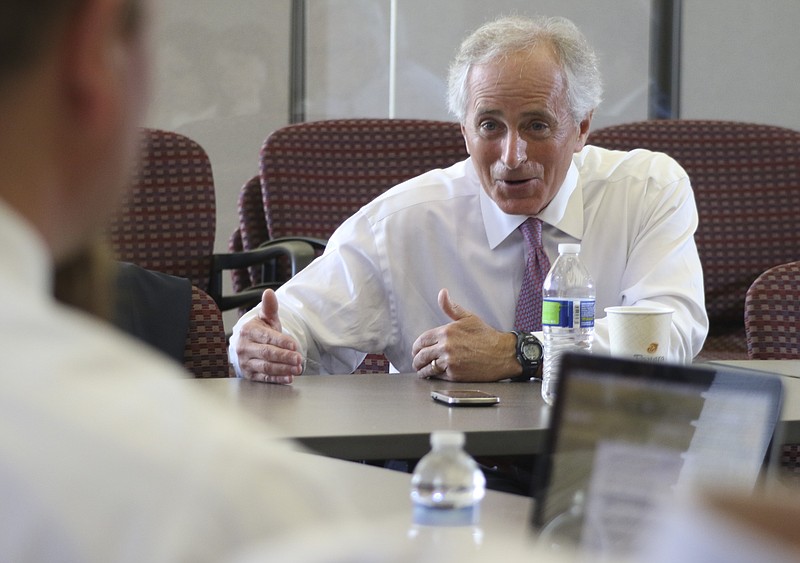Read more
Time magazine names Bob Corker one of the 100 most influential people in the world
Let's talk about Bob Corker.
Everybody else is.
"A good and decent man," the president said.
"The man with a plan for Iran," proclaimed The Economist.
"A senator from another time, an era when reaching out to the other side was more the norm," said The New York Times.
Time magazine just named him one of the most 100 influential people on Earth. In Washington, he's in the top five. As chairman of the Senate Foreign Relations Committee, Corker has the respect of his party, the ear of the president and the attention of world leaders.
He meets with Mossad, Israel's spy service. He talks with the leaders of our Arab allies. Sometimes he breakfasts with Henry Kissinger.
"Monday mornings, I catch a train and have breakfast with him," he said.
(Imagine the accents.)
These are the best days of Bob Corker, the thickest chapter so far in his biography. Watching him move through the halls of power, you get the sense this is what he's destined to do.
Did anyone see it coming?
Ten short years ago, Corker was Chattanooga mayor. Now, he's gone from City Hall to the world stage. From Tremont Tavern to breakfast with Kissinger. From dealing with Leamon Pierce to meeting with Bibi Netanyahu.
In the case study of Corker, what can we learn?
What's the moral of his story?
"Mr. Corker has shown that a reasonable man can get stuff done, even in an unreasonable town," writes The Economist.
Corker's ascendancy has not been defined by angry politics or ideological drama. Instead, he has chosen the better traits of statesmanship and common-ground politics. By praising him, America is not praising juvenile Washington, but a higher standard.
Just ask around.
"He wants to get something done rather than seek partisan advantage," Democratic Sen. Charles Schumer of New York told The New York Times.
"He is not simply trying to engage in a partisan exercise to kill the deal," added Sen. Chris Coons, a Democrat from Delaware.
"There have been many occasions where he has very much broken from the Republican message and was very much looking for a common way to move forward," added a third Democrat, Sen. Ben Cardin of Maryland.
Even if you don't like his beliefs, you can respect his methods, and maybe that's what all this praise is about. America is so hungry for some statesman like Corker, who has emerged out of the fractured Washington soil. Were some common-ground counterpart to emerge out of the Democrats, then bipartisanship could soon replace contrarianism as the congressional norm.
Yet I doubt any of this would happen if Corker runs for president.
Wrap him -- or anyone else -- up in the Machiavellian vote-getting spectacle that is the modern race for the White House, and all bets are off. Corker would instantly find himself beholden to the shape-shifting that must occur in order to get votes, endorsements, super-PAC money.
By not running for president, he remains somewhat free to roam through the political world: crossing aisles, finding common ground and so on.
It makes for interesting theory: How much is distorted by ambition? How much of our true self do we lose in the wanting and grasping for power?
Pry Corker open, and how much ambition spills out?
Perhaps we will find out.
Corker's star will continue to rise, maybe not to the White House, but possibly to some intimate Cabinet-level position there. The GOP nominee could tap him to run for vice president. He has proven himself already as worthy of secretary of State. Or Treasury.
But my wish for him is not political success, but political truth.
If he can continue to create the gravity that pulls Washington out of the mire and into its better days, then his influence will be far greater than Time magazine can predict.
Contact David Cook at dcook@timesfree press.com or 423-757-6329. Follow him on Facebook at DavidCookTFP.

